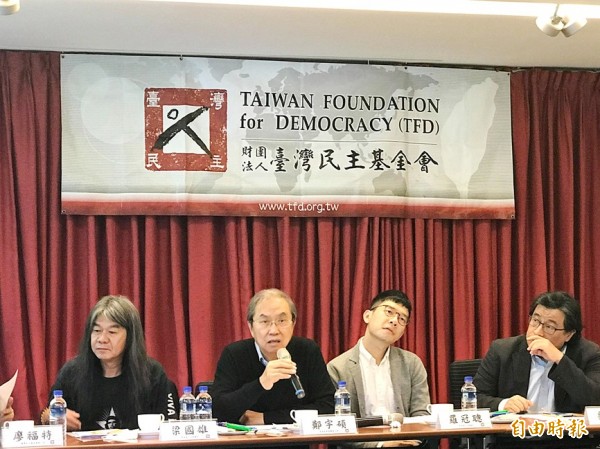《TAIPEI TIMES》 HK activists warn against China

From left, Leung Kwok-hung, Joseph Cheng, Nathan Law and Wu Rwei-ren take part in a forum in Taipei yesterday. Photo: Peng Wan-hsin, Taipei Times
‘TERMITE INFESTATION’: Taiwanese were too late to realize China’s infiltration and should work with Hong Kongers to stand up to Beijing, academic Wu Rwei-ren said
By Stacy Hsu / Staff reporter
Several academics and democracy advocates from Taiwan and Hong Kong yesterday exchanged views on how to withstand China’s increasingly aggressive infiltration tactics, and urged the public to unmask Beijing and see the authoritarian regime for what it really is to thwart its attacks.
“People have to recognize the fundamental nature of the Chinese Communist Party [CCP], a regime that upholds Marxism-Leninism [and] will never give up its monopoly on power ... and has the tendency to prefer harsh suppression over reform,” Hong Kong-based Alliance for True Democracy convener Joseph Cheng (鄭宇碩) told a forum held by the Taiwan Foundation for Democracy in Taipei.
Cheng, who has been pushing for a popular vote to elect the territory’s chief executive and Legislative Council members, said that society would inevitably become polarized as it seeks to fight Chinese aggression.
Cheng said that on Tuesday he joined a group monitoring electoral campaigns ahead of Saturday’s nine-in-one elections and heard strikingly different characterizations of China.
“Some candidates from one political camp repeatedly touted China’s economic development and how advanced Shanghai is. Meanwhile, candidates from another camp warned how China has been using the Internet to influence Taiwan’s elections,” he said, adding that the key to minimizing polarization is to engage in objective and evidence-based dialogue.
Veteran Hong Kong democracy advocate Leung Kwok-hung (梁國雄) — known locally as “Long Hair” — said neither the Chinese Nationalist Party (KMT) nor the Democratic Progressive Party seems equipped to lead Taiwanese in a fight against the CCP’s attempt to establish a political force in the nation through investment and cross-strait exchanges.
It is imperative that Taiwan’s ruling party explain to its people from the perspective of a possible new cold war that the nation is stuck between two major powers, and how Taiwan could survive globalization and find its place in the international division of labor, Leung said.
“It is meaningless to talk about whether [to declare] independence. You must first be able to achieve economic independence before you can have political independence,” he said.
Academia Sinica’s Institute of Taiwan History associate research fellow Wu Rwei-ren (吳叡人), a participant in the Wild Lily student movement in 1990, criticized the entertainment and culture industries for adopting a principle of separating politics from business when it comes to China.
“We have to know the enemy ... and like Cheng said, we have to see the authoritarian regime for what it really is,” Wu said.
Wu said Taiwan has long been under attack from China, which has employed a multifront tactic employing sharp power, military intimidation and diplomatic pressure, but Taiwanese did not realize it until Chinese infiltration has become too blatant to ignore ahead of the elections, Wu said.
It takes more than a single player to unmask a “giant” authoritarian regime like Beijing, so Taiwanese academics, media and civil society should work with their counterparts in Hong Kong and even in China to disclose and share information, Wu said.
National Cheng Kung University political science professor Leung Man-to (梁文韜), a Taiwanese born in Hong Kong who moved to Taiwan 17 years ago, said while China has seemingly honored its pledge to maintain the cross-strait “status quo,” it has been doing the opposite.
Leung Man-to said China’s handling of jailed Taiwanese human rights advocate Lee Ming-che (李明哲) and its efforts to have Taiwanese fraud suspects overseas deported to China are evidence of its attempts to slowly turn Taiwan’s domestic issues into its own.
“It is like a termite [infestation]. You will not realize your house’s interiors had been gradually hollowed out until it is too late,” he said.
新聞來源:TAIPEI TIMES












